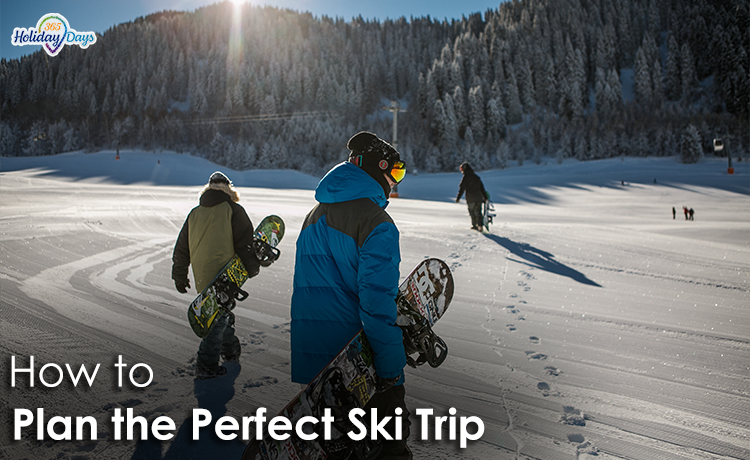
Introduction
If the thought of conquering the snow-capped slopes has been on your bucket list for a while now, then you’re in luck! With just a bit of preparation and research, planning your first ski trip can be easier than ever. From selecting the perfect destination to scoping out the best ski gear, this ultimate guide will provide all the tips and resources you need for a successful ski vacation. With our help, you can finally cross off that ski getaway from your list and hit the slopes like a pro!
Determine Your Budget
Skiing can be an expensive sport, so it’s important to determine how much you can afford to spend before you start planning your trip. Consider the cost of lodging, lift tickets, equipment rentals, transportation, and food. Your budget will determine the type of accommodations you can afford, the length of your stay, and the number of activities you can participate in.
Choose a Ski Resort
There are many ski resorts around the world, so it’s important to choose one that fits your skill level and budget.
When choosing a ski resort, consider the following factors:
- Skill level: Make sure the resort offers terrain suitable for your skill level. If you’re a beginner, look for resorts with easy, well-groomed runs. If you’re an intermediate or advanced skier, look for resorts with a variety of challenging runs.
- Snow conditions: Check the resort’s snow report to ensure there’s enough snow to ski on. Some resorts have more reliable snow than others.
- Lift tickets: Consider the cost of lift tickets and whether the resort offers discounts for multi-day tickets.
- Lodging: Look for accommodations that are close to the slopes or offer convenient transportation options.
- Amenities: Consider the resort’s amenities, such as restaurants, bars, spas, and shopping.
Book Your Lodging
Once you’ve chosen a ski resort, it’s time to book your lodging. Many ski resorts offer on-site lodging, but you can also find accommodations off-site. Consider the proximity to the slopes and amenities offered. If you’re traveling with a group, consider renting a condo or vacation home for more space and privacy. You can also save money by booking a package deal that includes lodging, lift tickets, and equipment rentals.
Rent Equipment
If you don’t have your own ski equipment, you’ll need to rent it. Many ski resorts have rental shops on-site, or you can rent equipment at a nearby shop. Make sure to reserve your equipment in advance to ensure availability. When renting equipment, consider the following:
- Skis or snowboard: Choose the appropriate equipment based on your skill level and personal preference.
- Boots: Make sure the boots fit well and are comfortable.
- Poles: If you’re skiing, you’ll need poles to help with balance and turning.
- Helmet: A helmet is essential for safety and can be rented or purchased.
Purchase Lift Tickets
Lift tickets give you access to the slopes, and they can be purchased in advance or on-site. Consider purchasing multi-day tickets to save money. Some resorts also offer discounted lift tickets for children, seniors, and military personnel.
Take Lessons
If you’re new to skiing, it’s important to take lessons to learn the basics. Most ski resorts offer lessons for all skill levels, so be sure to sign up in advance. Ski lessons can help you improve your technique, build confidence, and stay safe on the slopes. Group lessons are a cost-effective option, but private lessons
Pack Appropriately
When skiing, you’ll need warm, waterproof clothing, including a jacket, pants, gloves, and hat. Dress in layers so you can adjust to changing weather conditions. Don’t forget to pack sunscreen, goggles or sunglasses, and a helmet. Make sure your clothing is appropriate for the activity – you’ll need clothing that allows you to move freely and stay warm while you’re skiing.
Plan for non-ski activities
Skiing can be tiring, so it’s important to plan for non-ski activities. Many ski resorts offer activities such as snowshoeing, ice skating, and spa treatments. You can also explore the local area and enjoy winter sports like sledding or tubing. Make sure to take breaks and rest as needed to avoid fatigue and injury.
Consider Travel Insurance
Skiing can be a risky sport, so it’s important to consider travel insurance in case of injury or other unforeseen circumstances. Travel insurance can cover the cost of medical expenses, emergency evacuations, and trip cancellations. Make sure to read the policy carefully to understand what is covered and what is not.
Conclusion
Skiing is an amazing winter activity that can be enjoyed with friends and family. To get the most out of your ski trip, make sure to plan ahead by researching resorts, booking lodging and equipment rentals, purchasing lift tickets, taking lessons if necessary, packing appropriately, and considering travel insurance. By following these steps, you’ll have a safe and enjoyable skiing experience!
Happy Skiing!
